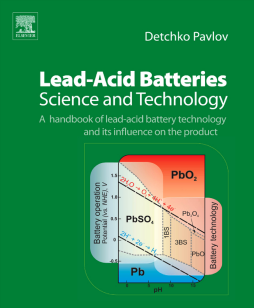
Additional Information
Book Details
Abstract
Lead-Acid Batteries: Science and Technology presents a comprehensive overview of the theory of the technological processes of lead-acid battery manufacture and their influence on battery performance parameters. It summarizes the current knowledge about the technology of lead-acid battery production and presents it in the form of an integral theory. This theory is supported by ample illustrative material and experimental data, thus allowing technologists and engineers to control the technological processes in battery plants and providing university lecturers with a toll for clear and in-depth presentation of the technology of lead-acid battery production in their courses. The relationship between the technological processes and the performance characteristics of the batteries is disclosed too.
- Disclosure of the structures of the lead and lead dioxide active masses, ensuring reversibility of the processes during charge and discharge and thus long cycle life of the battery
- Proposal of optimum conditions for individual technological processes which would yield appropriate structures of the lead and lead dioxide active masses
- Disclosure of the influence of H2SO4 concentration on battery performance parameters
- Discussion of the processes involved in the closed oxygen cycle in VRLAB and the thermal phenomena leading to thermal runaway (TRA)
- Elucidation of the relationship between technology of battery manufacture and battery capacity and cycle life performance
"The text is very accessible, being just as easy to navigate to specific sections for required information as it is to read in sequence as a textbook. The figures and tables are clearly presented and the text is accompanied by a comprehensive list of references for anyone requiring further information or original sources. This book is an up to date resource for lead-acid batteries and should be an essential on the bookshelf of anyone, academic or industrialist, working in the field or with an interest in the chemistry." --Chemistry World
